

Written by Stephen Day
Gas Safe Engineer
Updated: 3rd November, 2025
For most homes in the UK, the cost of heating and hot water can be very pricey. That's why keeping energy levels low is essential.
For most homes in the UK, the cost of heating and hot water can be a very pricey expenditure, with the Energy Saving Trust suggesting over half a home's yearly financial outgoings are spent in this area.
Get a quote in 60 seconds, fitted as fast as next day!
0% APR finance available.
Even though many modern high efficiency boilers are actually surprisingly affordable, the main thing to consider in terms of property financial frugality, is the current cost of living crisis.
With many home and amenity bills recently soaring to record highs in the UK, it is more necessary than ever to invest in a proficient boiler from a reputable brand
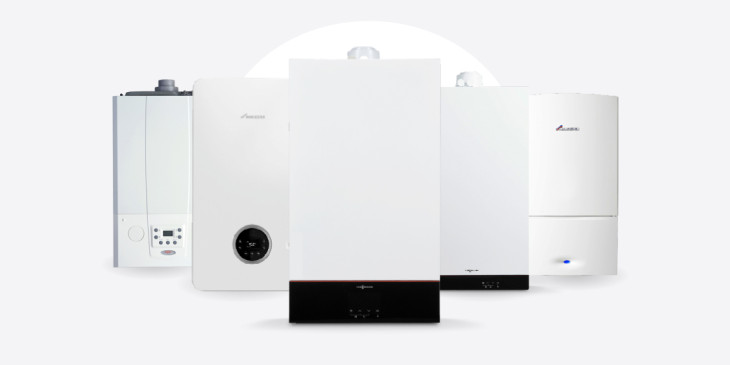
Naturally, the newer a central heating system, the more efficient it is due to engineering and design progression.
Outdated or failing systems could be the reason for your shock when seeing your monthly energy bills.
Most UK boilers are running at 80% energy efficiency with some older models operating at 60% or less!
These sub optimal levels of output are as avoidable as they are shocking.
Age of Boiler | Efficiency Percentage | Efficiency Rating (ErP) |
|---|---|---|
0+ Years | 90% + | A |
10+ Years | 85% + | B/C |
15+ Years | 80% + | C/D |
20+ Years | 70% + | E/F |
25+ Years | 60% + | G |
The direct correlation between a boiler’s age and its efficiency is clear to see in the newer systems’ ErP, so it may be worth upgrading your model to an energy efficient boiler.
Check out our handy guide on the most energy efficient boilers.
Below is a breakdown of data collated by the Energy Saving Trust, and what potential savings can be achieved per property type depending on the boiler efficiency bracket.
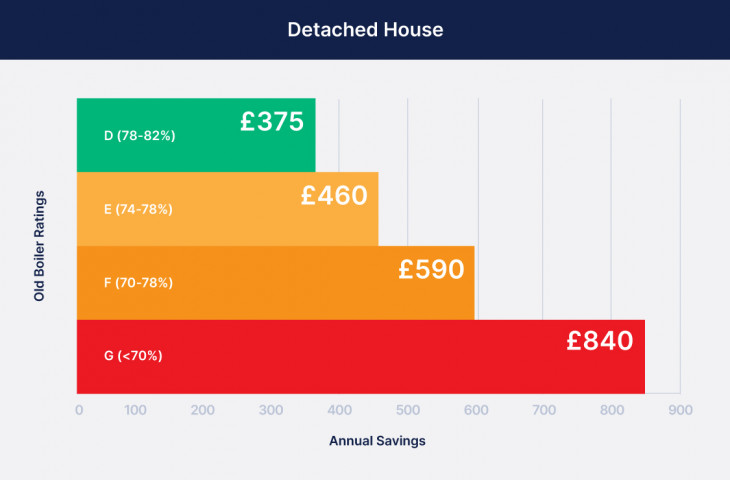
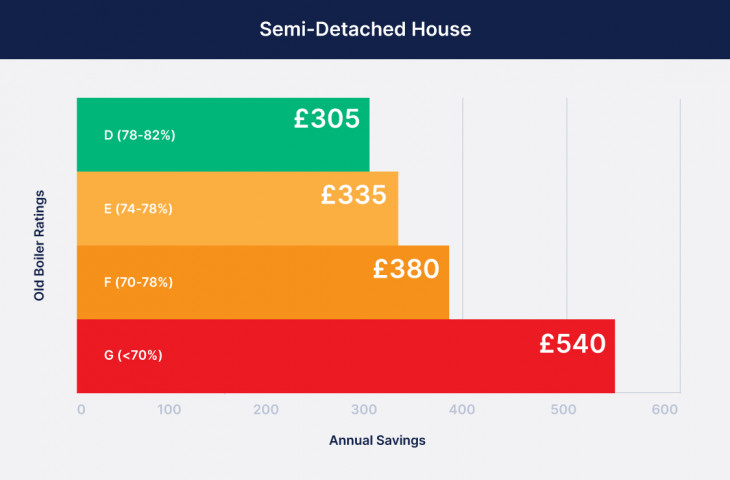
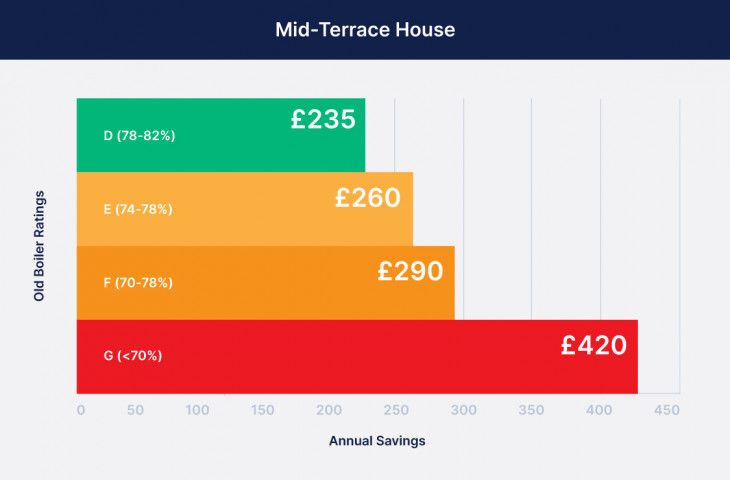
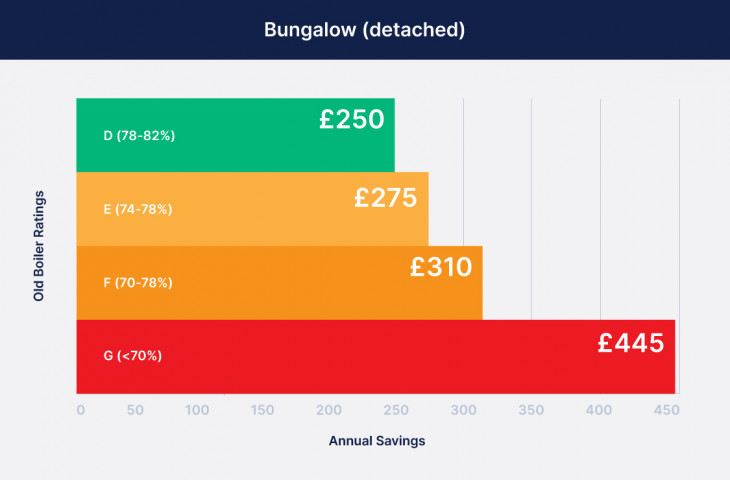
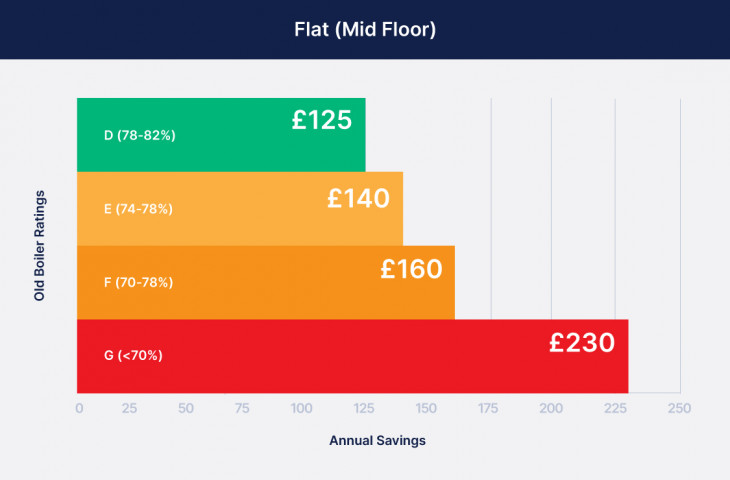
No matter what type of property, the evidence clearly suggests that upgrading to a modern, efficient boiler can create significant annual savings for you.
If it's not quite the right time to purchase a new modern boiler, or you recently have done, here are some more shrewd energy saving tips:
Learning how to control your heating system’s settings to deliver optimum temperature in accordance to your lifestyle can also save you lots of money on your bills.
The Centre for Sustainable Energy recommends programming your boiler to turn the heating on 30 minutes before you wake up in the morning but at a lower temperature.
Insulate your home to reduce heat loss through your walls and loft. Almost a third of heat lost in uninsulated homes escapes through the loft/roof.
Although loft insulation isn’t cheap, it can save you lots of money in the long run by £225 a year.
Cushion draught excluders are a cheap way to block draughts whilst accessorising your home and can be bought for as little as a pound.
Self-adhesive rubber seals for doors and windows are also relatively cheap and easy to install.
Swapping your single glazed windows to double or triple glazed also reduces heat lost through the glass.
If this is too costly, even closing your curtains at night can help to create a protective layer of insulation, but make sure to open them during the daytime to make the most of the heat from the sun.
Although having your sofa next to the radiator seems like a great idea, your sofa is in fact absorbing heat that could be warming the rest of the home.
Similarly, letting clothes dry and curtains rest on the radiators is preventing the hot air from circulating freely.
Reflective radiator panels are also a cheap way to bounce the heat back off the walls into the room.
Having your boiler serviced regularly by a Gas Safe registered engineer (such as an iHeat engineer) will ensure it is running efficiently and help to prevent it from breaking down, in turn saving you a potential hefty replacement cost.
Most boiler warranties also become invalid without a regular service, so take care of your boiler and it will take care of you.
A smart thermostat is exactly what it says on the tin, a thermostat that has the capability of connecting your heating system to the internet in order to remotely and efficiently control your property's heating from a phone or laptop.
Switch appliances off instead of leaving them on standby as they can still consume 75% of the energy they use when turned on.
Switch lights off when you leave the room.
Unplug or turn off chargers even if they are not plugged into a device.
Only boil as much water as you need.
Use extra layers such as clothes or blankets to stay warm.
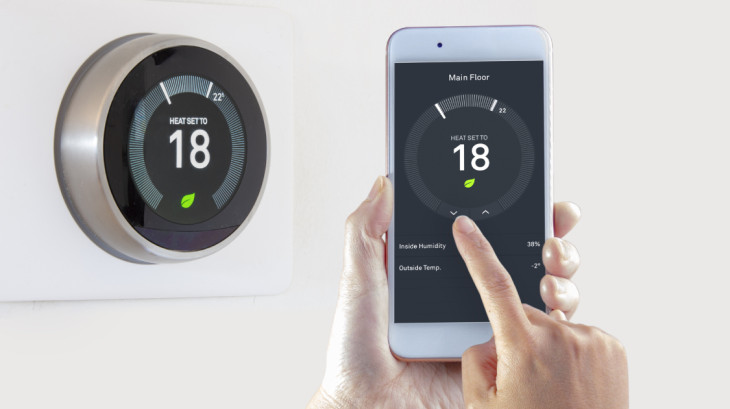
Public Health England states that 18ºC should be the minimum temperature in your living room in order to stay healthy and comfortable.
It’s also worth noting that anything lower than 12ºC puts you at cardiovascular risk, as does anything above 24ºC.
The average room temperature in the UK tends to fall around 20ºC, though it's generally a good idea to tailor the temperature to each room individually.
By reducing your room temperature by just 1°C, a change you may not even notice, you could potentially cut your bills by up to £100 a year in an average home.
The ideal temperature for the living room is between 19º and 22ºC. As the living room is usually the room where you’ll spend most of your time sitting still, you’ll likely need these warmer temperatures to stop you from getting chilly.
However, it’s also worth bearing in mind that the higher the temperature, the more energy you will be using, so we would recommend going no higher than 21ºC to keep heating bills low.
As you likely spend most of your time in bed under the covers in your bedroom, the temperature should be no higher than 20ºC. For those who prefer the room to be cooler at night, a temperature as low as 16ºC is also suitable.
However, if you have family members who prefer to spend most of their time in their bedrooms, we would recommend treating bedrooms the same as the living room when it comes to temperature and of course the individual’s preferences should be taken into account too.
Nobody likes waking up to a chilly bathroom in the morning, particularly during the winter months.
This is why we recommend setting your bathroom temperature to around 22ºC just before you wake up to ensure it’s comfortable by the time you come to get ready.
Once you start running the shower or bath, the humidity will help to keep the warmth in the air, meaning your boiler has less work to do to maintain the temperature, helping to lower the energy bills.
If you want an old inefficient boiler replaced, or just fancy an upgrade, get a fixed price, free quote on a wide selection of boilers with gas safe registered installation here at iHeat.
Last updated: 3rd November, 2025

Written by Stephen Day
Gas Safe Engineer at iHeat
Stephen Day is a Gas Safe registered and FGAS certified engineer with over 20 years of hands-on experience in the heating, cooling, and renewable energy industry, specialising in boiler installations, air conditioning, and heat pump systems.
LinkedInArticles by Stephen Day are reviewed by iHeat’s technical team to ensure accuracy and reliability.
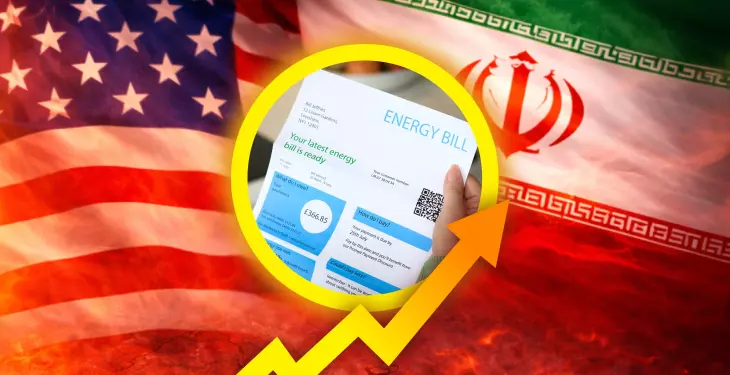
05th March, 2026
Rising tensions in the Middle East can influence global oil and gas markets, which can eve...
 Read Article
Read Article

27th February, 2026
Condensing boilers are considered to be some of the most efficient boilers out there on th...
 Read Article
Read Article

26th February, 2026
Vaillant boilers use a variety of parts to ensure efficient operation. This section looks...
 Read Article
Read Article
No obligation. Takes less than 60 seconds.